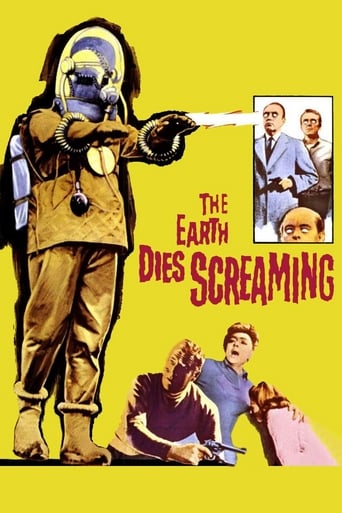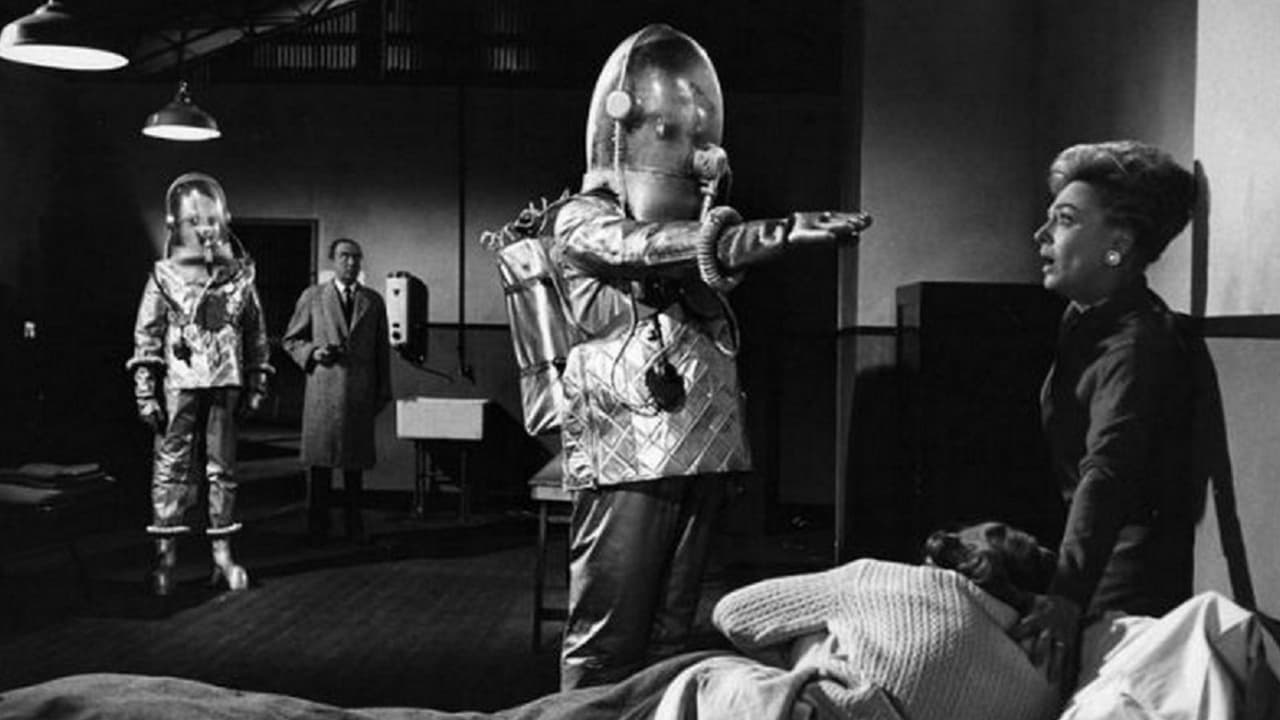dougdoepke
Lippert was a long time low-budget outfit in the US. Here, they went to England, probably because exchange rates got them bigger bang for the buck. Still, it's a minimal cast with minimal special effects—two robots lumbering around and about as scary as a hunk of junk. Seems the people in a rural section of England have died all at once, except for those protected from the ambient air. But the half-dozen survivors have to contend with alien robots who appear to be taking over, along with some of the zombified dead behind ping-pong eyes.It's a pretty good look at the English countryside. At the same time, the acting sort of comes and goes, though Parker makes a convincing leader of the survivors. Plus, the cast is hardly a collection of Hollywood glamour types, so realism wins out over eye candy. There's some suspense as we wonder what's behind the robots and the big die-off. But unhappily there's no tension nor any really scary moments. Too bad too that special effects didn't come up with better zombie eyes and maybe a couple of nasty moments that would have upped the scare factor. Anyway, the cheezy title is misleading since I never heard a single scream. I guess my biggest reaction is what Roger (drive-in) Corman would have done with the same material. Surely the movie wouldn't have been as civilized, but would certainly have been more fun.
ralphv1
A tense and brooding British film about an alien invasion told from the limited perspective of several people of disparate backgrounds who come together in a small English village. The film begins creepily enough with people dropping dead, some at the controls of vehicles, others while waiting for trains or doing other mundane tasks. The characters postulate that it was a gas attack because the survivors who tell their backstories all were cut off from outside air--in a high-altitude aircraft, in an oxygen tent, squatting in a bomb shelter, etc. Some characters are vague about their backgrounds, but none more so than Taggert. He carries a gun, dresses nattily, is highly secretive, and can pick a lock in seven seconds. Some might guess him a hood, but I'm thinking government agent, perhaps MI5. The wholesale death that may encompass all England, perhaps the world, is a prelude to an invasion. Who's behind it? That's a question left to conjecture, both by the characters and the audience. It's a vagueness that, to me, works within the context of the story. This film has some connections unnoticed by IMDb, primarily "The Poison Belt," a Professor Challenger story by Sir Arthur Conan Doyle in which the world succumbs to a gas zone through which it passes. The second connection is to another Professor Challenger story, "The Earth Screams," echoed in the film title. The theme is also carried in the film "Target Earth" in which several people awaken in a deserted city and are hunted by mechanical invaders. Connections aside, the film is engaging on its own merits and uses its limited budget to good effect. A great example of mid-century B- film science fiction, a last effort to appeal to an adult British audience before film studios realized the age of the average movie-goer was dropping, and dropping quickly.
bobc-5
Unconscious people peacefully slump over the controls of the trains, planes and automobiles they were piloting. This is naturally followed by the crashes of the aforementioned vehicles. A few lone survivors show up and band together as they try to figure things out. The screaming doesn't actually start until some strange space-suited creatures begin slowly lumbering around town and are eventually joined by those they've recently killed.The movie perhaps tries a little harder than comparable films in trying to create a dramatic scenario of survivors dealing with the aftermath of a holocaust they don't understand, but not a lot harder. Plot, character development and dramatic tension are mostly absent and the film plods along nearly as slowly as the completely out-of-place zombies. This may be a low-budget sci-fi film with laughable special effects and an over-the-top title, but the camp value is almost non-existent. On the plus side, its short running time does take some mercy on fans of the genre who feel compelled to see this movie in spite of its limited entertainment potential.
FilmFlaneur
The Earth Dies Screaming starts as something of a misnomer: budget limitations mean we only see the disaster's main effects within a very localised area of Northern England. As for the screaming, there's no human sound heard until 8 minutes into the film. Like many of the small cycle of English invasion films made at this time, Fisher's is small scale, almost domestic in setting, implying a catastrophe at a personal level just as much as on a national one. In contrast to those produced in America, English invasion movies were often less grandiose and paranoid, relying more on alien intrusions into more realistic, even humdrum worlds, places where the ordinary is ever present. Like the cult Devil Girl from Mars (1954) substantial scenes of TEDS take place in the comforting atmosphere of a pub or nearby where, it seems, British folk naturally congregate for comfort and safety: think of Shaun of the Dead's last refuge Director Fisher is most known for the series of Gothic horrors which have most occupied critical attention. His SF work has been readily dismissed as a genre in which he had little interest. TEDS was the first of a trilogy for the appositely named Planet Productions company, the others being Night of the Big Heat (1966) and Island of Terror (1967). All three feature alien invasion and a small group of people trying to fend off the intruders. Negative responses to these works perhaps stem from the fact that, often, the people are more interesting than the monsters and junk science on display, and the films lack the vibrancy of his horror work.At the heart of TEDS are three relationships: that between Quinn Taggart (a splendidly caddish Dennis Price) and Peggy (Virgina Field); the often drunk Otis (Thorley Walters) and his party friend Violet (Vanda Godsell), as well as the young couple Mel (David Spenser) with the pregnant Lorna (Anna Palk). Independent of this group is Jeff Nolan, played by the film's sole American actor. Producer Lippert had a successful formula of adding transatlantic appeal to films by stocking them with token imported talent. Here Willard Packer fits the bill. Packer is the man taking charge of events, organising the survivors, and figuring it out – right down to where the alien's transmitter can be found. He can be seen, in his mild way, as a typical 'Quatermass' figure: a technically competent individual taking charge to protect British society from intrusion. While no pure scientist, Nolan still has enough know-how to quickly grasp what has happened, how the invasion can be thwarted and to take decisive action. By the end of the film, he wins the right to a relationship of his own.Critics such as Peter Hutchings in 'We're All Martians Now' (British Science Fiction Cinema (Routledge, 1999)) have identified such influential figures as typically being a 'boffin-like protector of a society which seems incapable of protecting itself'. At the same time, through the imported novelty of his presence, Nolan is a reminder of British insularity. At time many of these films appeared British society was still relatively isolated, but under pressure from new pressures and changes, both international and local. Only the cynical Taggart has a competing world-view in the film that's as strong as Nolan's. For Taggart the new global conflict is over. Worse, "whoever did it has won
its every man for himself" - fatalistic sentiments in stark contrast to the famous spirit of the blitz, striking to many of those watching then. The punishment for his criminality and selfishness will be the loss of his tenuous relationship with Peggy and, ultimately his humanity, part of the alien zombie army.The biggest social change in Fisher's film is obvious – a successful first strike against British society, together with silver-clad aliens walking the streets, zombie workforce in support. Blank-eyed and as slow-moving as their masters, these zombies are among the most effective elements in the film. They must have been rather a novelty to contemporary audiences. I can't, off-hand, think of an earlier representation of the creatures in British cinema before this (Hammer's Plague of the Zombies appeared two years later, but even so is set in the past). They provide one of the highlights of the film – a scene when Peggy is pursued, then trapped breathlessly in a bedroom closet, when Fisher makes use of a very dramatic close up to add terror.In contrast to the unsuccessful efforts of the un-dead to find a female, Nolan succeeds in gradually establishing a relationship and, one presumes, goes on to a successful romance. His success against the invader acts as a catalyst. By the end of the film he is entitled to reintegrate back in society. There's a parallel to be found between the zombie's painfully slow pursuit search and unnerving, soulless staring at the closet in which Peggy hides to another scene where Nolan had looked on, affectionately, as she pottered over small things in the pub's kitchen. The difference between humanity and the alien, the film suggests, is that the former can bring value and sentiment to what it sees and so, once again, the British invasion variant gravitates naturally to the domestic.TEDS is further helped by a very effective score by Elizabeth Lutyens, as well as some crisp, atmospheric cinematography by Arthur Lavis, especially effective when shooting on village location. These are elements that help to make it my favourite out of Fisher's small group of SF movies, a feeling which even the over-acting of Walters can't dissipate. It 's also blessed with a dramatic pre-title sequence - a world wrecked by sudden accident, recalling the night before Day of the Triffids, as well as an eerie sense of a familiar landscape made empty, a horror-fantasy tradition which persists right down to such British films as 28 Days Later. Fisher's film may be short, cheap, and with a disappointingly flat denouement, but its modest pleasures easily invite revival.



 AD
AD



